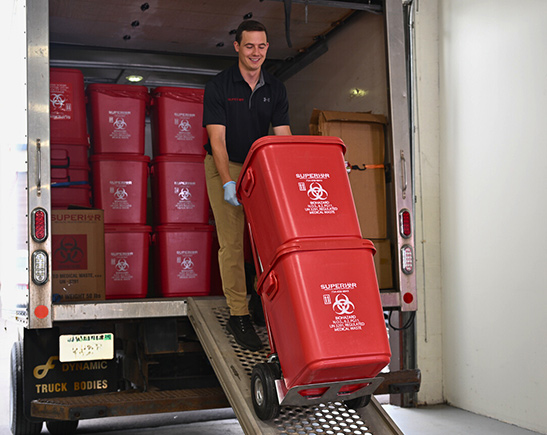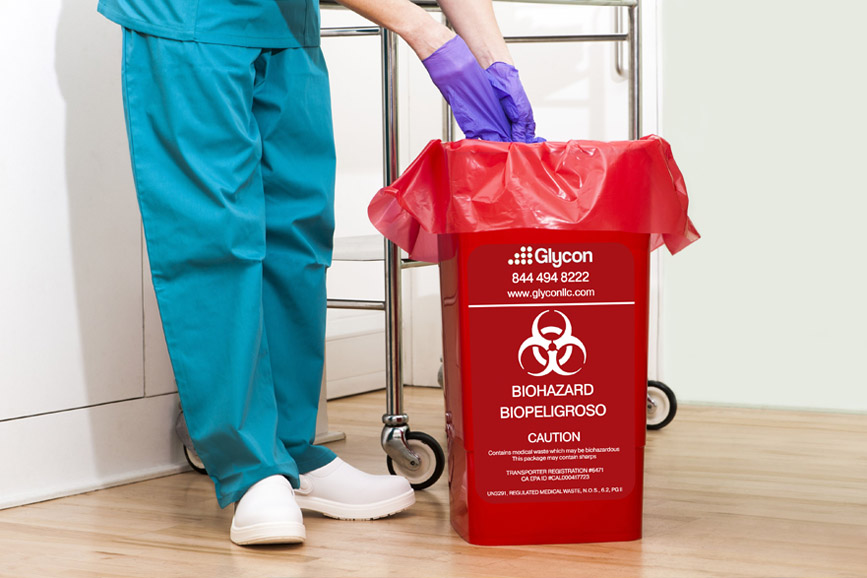Your Relied On Partner: Medical Waste Removal Services Tailored to Your Demands
Stay Ahead of Laws: Specialist Advice on Medical Waste Disposal
In a world where the medical care sector is frequently progressing, it is imperative for clinical centers to remain ahead of regulations when it comes to the correct disposal of clinical waste. From understanding the various classifications of medical waste to implementing the ideal collection and segregation approaches, this conversation will certainly provide beneficial understandings and actionable ideas to aid facilities remain ahead of regulations in the ever-changing landscape of clinical waste disposal.
Understanding Clinical Waste Categories
Understanding clinical waste categories is essential for correct disposal and administration in medical care facilities. Clinical waste refers to any kind of waste generated by health care tasks that might pose a hazard to public health or the atmosphere. It is crucial to categorize medical waste precisely to guarantee its safe handling, disposal, therapy, and transport.
There are several classifications of clinical waste that medical care centers require to be acquainted with. One of the most common classifications consist of contagious waste, pathological waste, sharps waste, pharmaceutical waste, and chemical waste. Each classification has certain standards and regulations for its appropriate administration and disposal.
Pathological waste refers to human cells, body organs, or body components that require unique handling and disposal. Drug waste makes up ended, unused, or contaminated drugs that need careful handling and disposal.
Remaining Up-To-Date With Regulatory Adjustments
Remaining existing with governing modifications is crucial for healthcare centers to make sure compliance and proper monitoring of medical waste disposal. medical waste removal. With guidelines continuously progressing, it is essential for healthcare centers to stay up-to-date to stay clear of charges, fines, and possible damage to the atmosphere and public health
To remain ahead of regulatory adjustments, healthcare facilities need to establish a system for monitoring and monitoring updates. This can be done by signing up for governing newsletters, participating in workshops and conferences, and proactively participating in sector organizations. Furthermore, facilities must designate a personnel or team liable for staying educated and distributing details to relevant stakeholders.
Normal communication with governing agencies is likewise important. Health care facilities need to establish partnerships with local, state, and government firms to ensure they are conscious of any type of changes in regulations that might impact their waste management methods. This can be done via regular meetings, engagement in public comment periods, and proactive interaction with regulative agencies.
In addition, healthcare centers need to think about partnering with waste management business that focus on medical waste disposal (medical waste disposal services with WasteX). These firms are frequently skilled in the latest policies and can supply advice and assistance to ensure compliance
Carrying Out Correct Collection and Partition Methods
To efficiently handle medical waste disposal, health care centers need to develop appropriate collection and partition techniques based on governing standards. Applying these approaches makes certain the secure handling and disposal of possibly unsafe products, shields the setting, and decreases the danger of injuries and infections to medical care workers and the basic public.
Correct collection and partition techniques involve using assigned containers and identifying systems. Healthcare facilities need to give clearly identified containers for different kinds of clinical waste, such as sharps, transmittable waste, pharmaceutical waste, and non-hazardous waste. These containers must be color-coded and clearly marked to avoid complication and advertise simple identification.
In addition, health care centers need to train their team on the appropriate treatments for gathering and segregating medical waste. This consists of educating them on the various sorts of waste, the suitable containers to utilize, and the significance of following standards and policies. Regular training sessions and correspondence course ought to be performed to guarantee that personnel continue to be updated on ideal methods.
Furthermore, medical care facilities should develop a system for regular collection and disposal of medical waste. This might involve partnering with qualified waste administration companies you could try here that focus on clinical waste disposal. These business will certainly ensure that the gathered waste is carried and dealt with in conformity with governing requirements.
Selecting the Right Disposal Methods

Incineration is one of the most reliable and usual approaches for disposing of certain kinds of clinical waste, such as pathological waste and sharps. It entails the controlled combustion of waste at heats, lowering it to ash. Incineration can release hazardous pollutants into the air and add to air pollution.

Chemical therapy involves the usage of chemicals to neutralize the here waste and disinfect. Microwave therapy uses microwave energy to warmth and decontaminate the waste.
Ensuring Compliance With Documentation and Training
After thoroughly thinking about the proper disposal techniques for medical waste, health care facilities have to ensure conformity with laws and decrease ecological effect by executing effective documents and training treatments. This action is vital in preserving a risk-free and sustainable environment for both healthcare employees and the general public.

Health care workers that handle clinical waste should receive appropriate training on waste segregation, handling, and disposal treatments. By providing extensive training, medical care centers can encourage their team to make educated choices and reduce the risk of incorrect waste disposal.
Final Thought
Finally, staying ahead of regulations in clinical garbage disposal is vital for medical care centers. medical waste removal services. Comprehending the different groups of clinical waste, staying updated with regulatory adjustments, applying appropriate collection and segregation approaches, selecting the appropriate disposal methods, and ensuring conformity with documentation and training are all crucial actions. By following these standards, medical care companies can effectively get rid of and take care of of medical waste in a accountable and safe way
From understanding the various categories of clinical waste to executing the ideal collection and segregation approaches, this discussion will certainly offer actionable pointers and important understandings to help facilities remain ahead of regulations in the ever-changing landscape of clinical waste disposal. - medical waste disposal services with WasteX
The most common categories include contagious waste, pathological waste, sharps waste, pharmaceutical waste, and chemical waste. Health care facilities ought to offer clearly identified containers for different types of medical waste, such as sharps, contagious waste, pharmaceutical waste, and non-hazardous waste. Health care facilities ought to develop a detailed system to videotape and track all facets of clinical waste disposal, consisting of kinds of waste created, amounts, and disposal go now techniques utilized. Healthcare workers who handle clinical waste needs to obtain proper training on waste partition, managing, and disposal treatments.